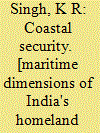| Srl | Item |
| 1 |
ID:
113845


|
|
|
|
|
| Publication |
New Delhi, Vij Books India Pvt Ltd, 2012.
|
| Description |
x, 287p.
|
| Standard Number |
9789381411292
|
|
|
|
|
|
|
|
|
|
|
|
Copies: C:1/I:0,R:0,Q:0
Circulation
| Accession# | Call# | Current Location | Status | Policy | Location |
| 056724 | 359.00954/SIN 056724 | Main | On Shelf | General | |
|
|
|
|
| 2 |
ID:
116553


|
|
|
|
|
| Publication |
2012.
|
| Summary/Abstract |
In State practice, it is common for coastal States to claim maritime geographic features based on the principle of "land dominating the sea". International law recognizes such State practice as long as the related claims are consistent with the applicable international legal norms and rules. While it is relatively clear and recognizable that coastal States have the right to claim geographic features above the water, it remains controversial and unclear whether coastal States could have the right to claim submerged geographic features. It is the purpose of this article to discuss the issues concerning the claims to maritime geographic features to see whether a clearer way can be found to sort out the issues or whether these issues will remain a conundrum to international lawyers as well as to the whole international community.
|
|
|
|
|
|
|
|
|
|
|
|
|
|
|
|
| 3 |
ID:
118305


|
|
|
|
|
| Publication |
2012.
|
| Summary/Abstract |
Among China's unresolved frontier questions, the South China Sea has become the most complex and troubled, and arguably the most significant and disconcerting. The economic and security stakes are high and the stake-holding states numerous and diverse. The claims that China (and others) make about the region reflect such interests but they are, ultimately, legal claims. Beijing's assertions of rights to the disputed areas have rested on three conceptually distinct grounds. Each presents a different mix of challenge and accommodation to international legal norms and the interests of other states, including China's neighbors, near-neighbors and the United States.
while China's behavior (as well as that of other interested states) has been more and less assertive at various times, China's three basic arguments claiming rights to the region have been comparatively stable. Both China's pattern of multiple legal arguments and fluctuating actions and rhetoric do little to resolve the debate over whether a rising China will be deeply disruptive of the regional and international order or whether it can-with sufficient skill and tolerable adjustments-be accommodated and integrated. Although China's stance on rights in the South China Sea may be partly the accidental product of conflicting agendas and shifting assessments, Beijing's embrace of three distinct lines of legal argument arguably constitutes a strategy that serves China's interests given the factual, legal and strategic environment that China faces.
|
|
|
|
|
|
|
|
|
|
|
|
|
|
|
|